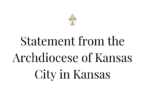by Joe Bollig
joe.bollig@theleaven.org
KANSAS CITY, Kan. — The Archdiocese of Kansas City in Kansas and Villa St. Francis have won a major legal victory in their fight against the U.S. Department of Health and Human Services contraception mandate.
The archdiocese, the Villa and seven other members of the Catholic Benefits Association won an injunction against being forced to comply with the HHS contraception mandate, part of the Affordable Care Act.
U.S. District Court Judge David L. Russell of the Oklahoma Western District Court issued the 21-page ruling in the case of Catholic Benefits Association LCA et al. v. Sebelius et al. on June 4.
His decision said that the CBA, comprised of over 400 Catholic employers and 2,000 parishes, was to provide health care benefits in compliance with Catholic faith and morals. Its members include dioceses, Catholic Charities affiliates, colleges and other Catholic entities.
The archdiocesan health insurance plan is exempt from the HHS mandate at this time because it is “grandfathered,” said Archbishop Joseph F. Naumann. Villa St. Francis, however, is not part of the archdiocesan plan and thus was sub- ject to the mandate.
“This decision gives [Villa St. Francis] the freedom not to provide abortion services, contraception and sterilization in their employee health plan,” said the archbishop. “So, it was an important victory for the archdiocese and Villa St. Francis.”
It’s an important victory, but not necessarily a permanent one. The federal government could decide to ap- peal the ruling and take the case up to the next level — the federal appellate court.
“It’s possible that the government, at some point, will give up what has been to this point a relentless determination to make Catholics and others violate their conscience, and make our ministries violate Catholic moral principles,” said Archbishop Naumann.
Even if they don’t, he said, a number of victories on the federal district court level strengthens the position of the CBA and its members. The next step above the appellate level would be the U.S. Supreme Court.
“We’re happy with the decision,” said Archbishop Naumann. “It’s up to them if they’re going to appeal the ruling.”
The government’s case for the contraception mandate is “bizarre,” he said, because, on one hand, it’s saying that contraception coverage is so essential that religious freedom and liberty have to be overridden in order to provide it, but it’s also exempting many other institutions from the mandate. How, then, can this mandate be essential?
“It’s a rather outrageous argument the government is trying to make, and it cer- tainly seems like it’s a vendetta against religious institutions,” said Archbishop Naumann. “It’s more the federal government wanting to force churches to comply with an ideology that thinks contraception, abortion and sterilization is somehow a constitutional right.”







